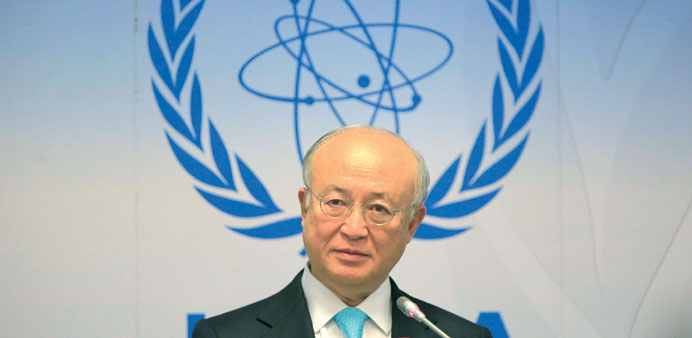“This is not the right way to address issues of such great importance to the international community, including Iran”
AFP/Vienna
The head of the UN atomic agency upped the ante with Iran yesterday, saying Tehran may have literally bulldozed a key part of its probe into alleged efforts to develop a nuclear bomb.
Yukiya Amano of the International Atomic Energy Agency said that because of “very extensive” engineering work at the Parchin military base, visiting could now be pointless.
“It may no longer be possible to detect anything,” Amano told a news conference at IAEA headquarters in Vienna after previously having said that Iran’s activities would “seriously undermine” its probe.
“I wish we had had the opportunity to have access to Parchin much earlier.”
But Amano added: “I still believe it is necessary for us to have access to the site because by visiting the site we can learn a lot of things. Also we should not forget it is not only the site that we have questions (about).”
Iranian diggers and dumper trucks moved in after January 2012 when the IAEA requested access to Parchin, the watchdog says, following seven years of “virtually no activity”.
The work spotted by satellite included the “massive removal of soil, asphalting and possible dismantling of infrastructure”, Amano said.
The IAEA believes Iran constructed a large explosives containment vessel at Parchin in 2000 to conduct experiments that it says would be “strong indicators of possible nuclear weapon development”.
Iran has rejected IAEA requests to visit the site and denies ever having worked on developing a nuclear weapon. It says that the IAEA’s allegations are based on faulty intelligence provided by Tehran’s enemies.
Iran says the IAEA has no right to demand inspections at Parchin because, it insists, it is a non-nuclear site, and that the agency already visited it twice in 2005.
The allegations on Parchin form part of a major report issued by the IAEA in November 2011 summarising information on suspected nuclear weapons research that it had been given, mostly but not only by foreign intelligence agencies.
In 10 fruitless meetings since then the IAEA has pressed Iran for access to documents, sites and scientists involved in these alleged activities, which the agency believes were carried out mostly before 2003 and possibly since.
Amano said yesterday that in these talks, the latest of which took place on May 15, Iran and the IAEA were “going around in circles”.
“This is not the right way to address issues of such great importance to the international community, including Iran,” he told a closed-door meeting of the IAEA’s 35-nation board of governors.
Iran says the IAEA’s findings are based on faulty intelligence from foreign spy agencies such as the CIA and Israel’s Mossad—intelligence it complains it has not even been allowed to see.
Parallel negotiations between Iran and six world powers—the US, China, Russia, Britain, France and Germany—are also stalled following the latest gathering in Almaty, Kazakhstan in early April.
This diplomatic track, on hold until after Iran’s June 14 elections, is focused more on Iran’s current activities, which Iran has continued to expand in spite of UN Security Council resolutions calling for a suspension.
In particular, and despite sanctions aimed at preventing such advances, it has boosted its capacity to enrich uranium, which in its highly purified form can be used in a nuclear weapon.
Iran says it needs the material for power generation and medical isotopes.
An additional worry is Iran’s progress, outlined in the latest IAEA report on May 22, in building a new reactor at Arak which could in theory provide Iran with plutonium, if the fuel is further processed.
Plutonium is an alternative to highly enriched uranium for a nuclear weapon. North Korea used plutonium in two tests in 2006 and 2009.
The IAEA board was expected however to refrain from any action over Iran at its board meeting that started yesterday, in part because of Iran’s elections—even though analysts expect no major change in Tehran’s nuclear policy.

